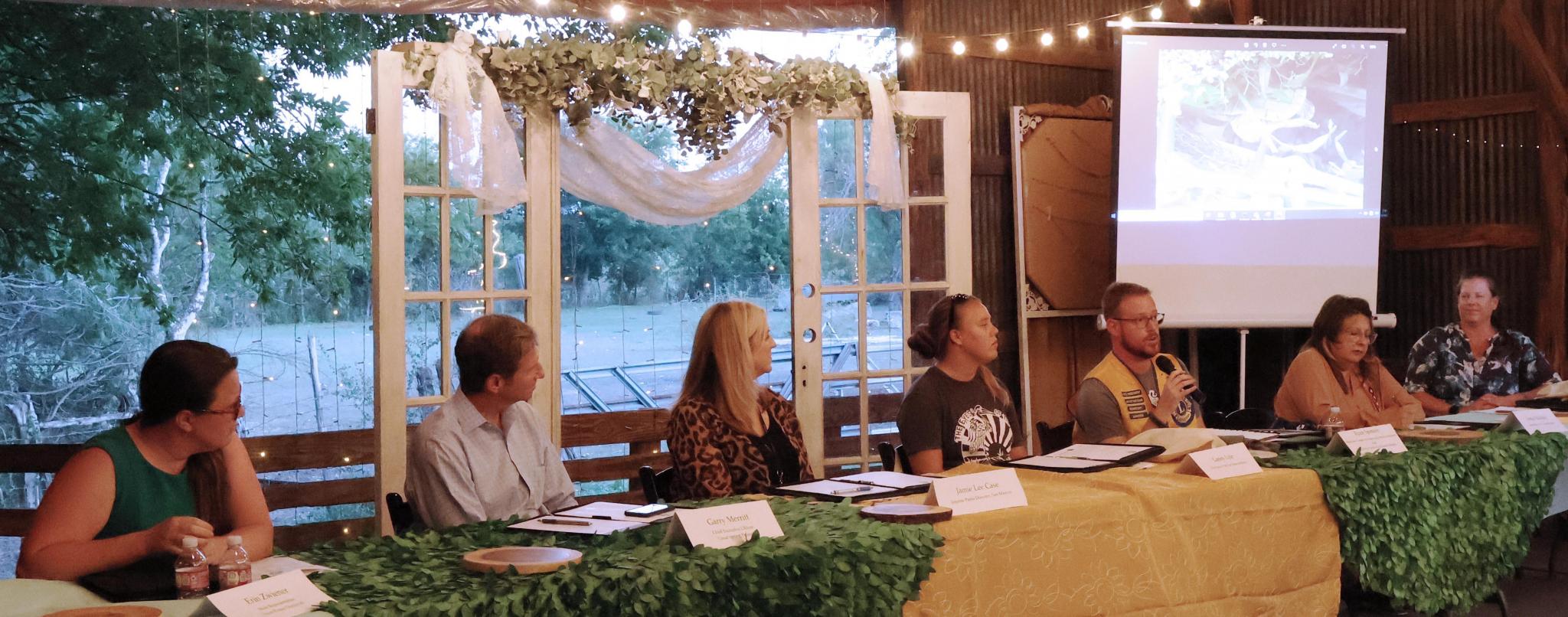
The 4th Annual River Guardianship Symposium took place Wednesday. Above, panelists, from left to right, Erin Zwiener, Garry Merrit, Jamie Lee Case, Laney Lyle, Ryan Spencer, Sonja Villalobos and Kimberly Meitzen take part in a discussion. Daily Record photo by Zoe Gottlieb
Local leaders call for collaboration at 4th Annual River Guardianship Symposium
Spirits could not be dampened at the 4th Annual River Guardianship Symposium on Wednesday, as researchers, nonprofit leaders, and public officials gathered to celebrate the progress made on the Great Springs Project and “engage in a conversation with diverse stakeholders about a single-use disposable container ban for the San Marcos River.”
Great Springs Project CEO Garry Merritt opened the symposium with a status update on the project to connect four springs — San Antonio, Comal, San Marcos, and Barton — from the “Alamo to the capital” through 100 miles of trail.
Merritt said his organization has already laid 30 to 33 miles of the trail and is working with conservation buyers and public dollars to acquire the rest.
“When (people) experience it, they learn to love it," said Merritt of how the trails will benefit the community. "When they love it, they want to protect it.”
The 2022 symposium featured exhibition booths and a Q&A session with panelists Ryan Spencer with Meadows Center and the San Marcos Lion’s Club Board; New Braunfels River Operations Manager Amy Niles; Laney Lyle with The Eyes of the San Marcos River; Martindale City Councilmember Sonja Villalobos; City of San Marcos Parks Director Jamie Lee Case; and Todd Derkacz of the San Marcos Greenbelt Alliance.
The theme for this year’s event “was on blue [river-based] and green [greenspace area] trails and how to balance environmental protection/conservation with recreational use,” Kimberly Meitzen, symposium co-chair and assistant professor of Geography at Texas State University, told the Daily Record.

Above, Greenbelt Alliance trail crew leader Todd Derkacz beams as he holds his River Guardianship Award, given to him by the Mermaid Society SMTX for his work designing the city's greenspace trails. Daily Record photo by Zoe Gottlieb
Defining the issues
This year’s panel focused on three main questions:
•What are the greatest challenges and/or threats to protecting the natural resources of our rivers and green spaces for recreation?
•How does your entity/organization address these?
•What can our audience and community do to reduce the impact to our river and greenspace resources and support and/or continue to provide recreation opportunities in these environments?
Of the threats and challenges, one of the themes panelists brought up the most was the need to combine recreation with education.
“We can post all of the signs we want to post,” Case said. “But that doesn't mean you're going to read them or follow the rules.”
Another issue State Rep. Erin Zwiener brought forward was Texas' lack of legislative environmental protections.
“[We are] relying on legislation that was mostly signed under Richard Nixon,” Zwiener said. “There's some big, powerful laws that we've had successes with, but they don't necessarily meet the needs of the moment.”
Panelists also gave examples of the work their organizations have done to propel the river conservation movement forward.
Lyle highlighted that in 2022, her network of 200 volunteers removed 12,000 pounds of trash from the San Marcos River, triple the amount of trash they removed last year.
Niles said New Braunfels, the city she represents, has taken a policy-based approach to river conservation with a $2 River Management Fee to help river users “find the value in what we're doing.”
Single-use container ban
New Braunfels and Martindale have single-use disposable container bans, according to Meitzen, and representatives from both cities were invited to Wednesday’s symposium to share their perspectives on the challenges, implementation, and successes of the policy for their communities.
Funding and enforcement of the container ban are both major hurdles for city representatives, Meitzen said.
During the discussion, a suggestion was made to include tourism-based river user fees and parking fees as funding sources, but “with the goal to not charge local residents for either.”
The audience also encouraged the Mermaid Society to keep the conversation going and engage local politicians in the process to make these changes for the community.
“We also suggested that the creation of a River Advisory Board or River Committee would help provide a platform to provide guidance to the city on environmental and societal river management issues, and there was also a discussion of the need for such a conversation to occur between counties and cities on the lower San Marcos River,” Meitzen said.
Call to action
The Q&A session concluded with suggestions from each of the panelists on how community members can get involved and a final call to action.
Meitzen said her desire in bringing together the panel was to have communities along the Great Springs Project come together, look at the different issues and challenges, and find ways to address them.
“Earlier during Merritt’s presentation, he talked about how you look to the right and can see our neighbors are doing the same thing,” Meitzen said. “So maybe we can get together and do it better.”











